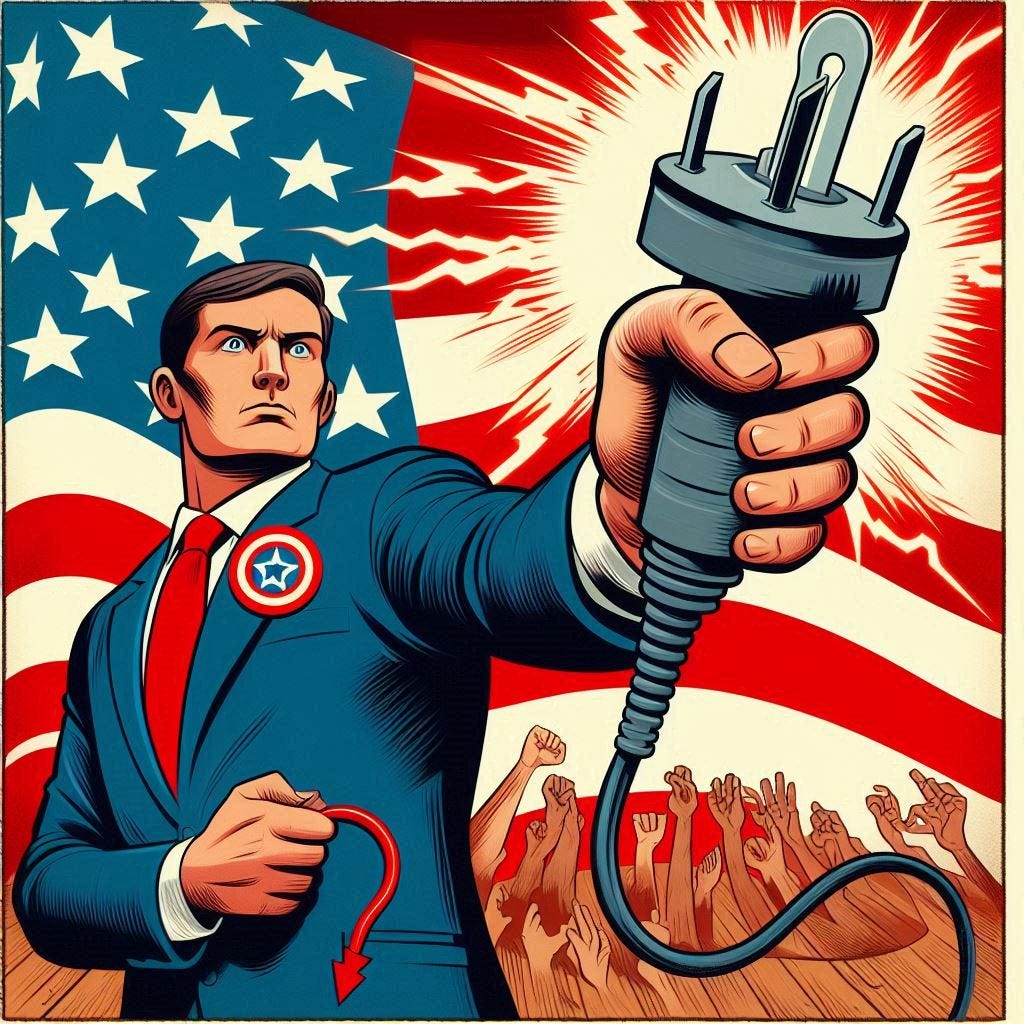Should Conservatives Wield Government Power The Fix To America's Ills?
Are NatCons right that restraint must be cast aside?
During his first Inaugural Address in 1981, President Ronald Reagan crystalized what the conservative movement believed at the time:
In this present crisis, government is not the solution to our problem; government is the problem. From time to time we've been tempted to believe that society has become too complex to be managed by self-rule, that government by an elite group is superior to government for, by, and of the people. Well, if no one among us is capable of governing himself, then who among us has the capacity to govern someone else? All of us together, in and out of government, must bear the burden. The solutions we seek must be equitable, with no one group singled out to pay a higher price.
Compare Reagan's statement to this from "National Conservatism: A Statement Of Principles" published in June of 2022.
We recommend the federalist principle, which prescribes a delegation of power to the respective states or subdivisions of the nation so as to allow greater variation, experimentation, and freedom. However, in those states or subdivisions in which law and justice have been manifestly corrupted, or in which lawlessness, immorality, and dissolution reign, national government must intervene energetically to restore order. (emphasis mine)
At times in our history, the national government has intervened in state affairs with positive benefits, as in the civil rights era efforts to topple Jim Crow. Other times, federal intervention has had disastrous effects. Nevertheless, the NatCon statement is much too broad for my taste. How should we define "lawlessness, immorality, and dissolution?" And what exactly is the government's role in enforcing morality? That idea is a long way from how I interpret the vision of the Founding Fathers of a government that doesn't allow one faction to dominate over other factions (see Federalist 10).
This tension on the Right was discussed and debated this past weekend at the Club for Growth's Policy Colloquium. I was invited to attend as were several other state-based public policy groups. Also in attendance were folks from several DC-based center-right organizations. You can read the policy handbook they gave us here. It’s worth a read.
The event featured presentations from experts on topics such as energy, taxation, transportation, education, regulation, and legal theory. Our pal Erick Erickson delivered the keynote speech at the closing dinner Saturday night.
The session on legal theory was led by Club for Growth President David McIntosh. He began his presentation by describing the divide with the conservative movement as those who still hold to the idea of Originalism as opposed to those who want conservative Judges to become activists, overturning legal precedent in order to advance conservative political ideology. This would run counter to decades of conservative legal thought, which sought to understand how the Founding Fathers saw the Constitution and hold fast to that interpretation. Conservatives have never viewed the Constitution as a "living document," until now.
In my mind, this encapsulates the tension that exists currently within the conservative movement. NatCons would say that after decades of progressive victories in all areas of society, restraint must be cast aside. "Do you know what time it is?" is a common question asked of those of us saying we must continue to respect the restraints placed upon us by the Constitution and the rule of law. "We must seize power and use it to vanquish our enemies and start winning" is the goal behind this new line of thinking.
However, I and others maintain that using the power of government to create some sort of conservative utopia will fail as miserably as those on the far Left who seek to create a progressive utopia. Despite claims to the contrary, the United States is not a socialist nation. Is the government too big and too invasive? I would agree that it is. But the tools to beat it back into the guardrails of the Constitution are still within our grasp.
I'm sympathetic to the NatCon's assessment of American society. Hollywood, Big Media, and College Professors do lean heavily to the Left. They do attempt to shape the views of the next generation and have had a measure of success. Yes, we have seen a rise in anti-semitism across our country, which is cause for concern. Yet despite the "encampments" and protests on college campuses across the country and here in our own state, they represent a tiny percentage of those student bodies. At UGA, a dozen or so folks showed up to protest Isreal, out of a student population of well over 35,000. We even saw frat boys come to the rescue of displaced American flags in places like UNC and Ole Miss. Support for Israel's right to defend itself remains strong across the political spectrum. While we should oppose instances of anti-semitism we see, we can't really call what we saw on college campuses a victory for the far-Left. We can find other encouraging victories in Hollywood and in skepticism of Big Media and credible alternative sources of information.
Maybe I can be dismissed as another Zombie Reganite, and that's OK. I still think the tried and true principles of the free market, which has lifted 60% of the world's population out of poverty, are worth fighting for. I still think American leadership is preferable to a world dominated by authoritarian regimes like those found in Russia or China.
Is America perfect? Of course not and guess what, as long as humans instead of angels govern us, we never will be. But I'll take our imperfect freedom over activist government (be it left wing or right wing), any day of the week.



